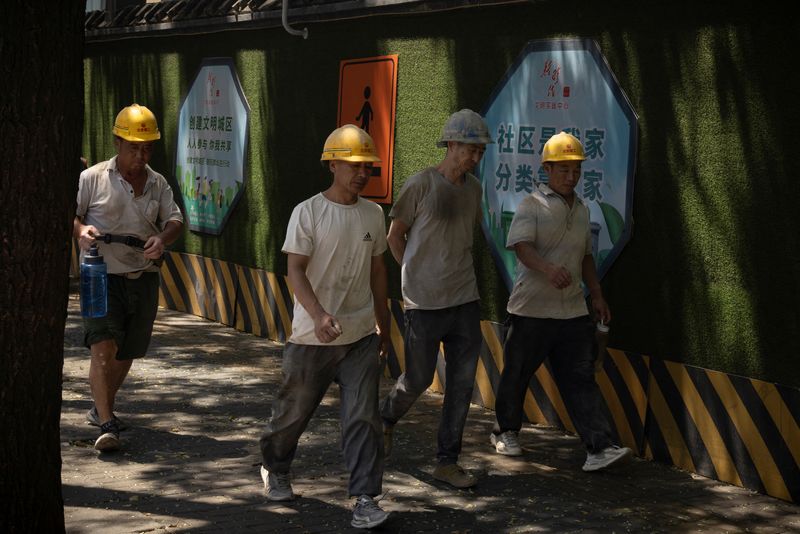By Jonathan Cable, Leika Kihara and Lucia Mutikani
LONDON/TOKYO/WASHINGTON (Reuters) -Global factory activity remained in a slump in July, private surveys showed on Tuesday, a sign slowing growth and weakness in China were taking a toll on the world economy, though the picture in the Americas was notably less bleak than elsewhere.
The downturn highlighted the dilemma for policymakers who embarked on aggressive monetary policy tightening cycles in a battle to keep inflation at bay and yet also need to try and forestall potential recessions.
S&P Global (NYSE:SPGI)'s gauge of worldwide manufacturing activity held steady at 48.7 in July, matching the lowest level since June 2020, with subindices of factory output and new orders both slipping to six-month lows. A reading below 50 marks a contraction in activity.
A Purchasing Managers' Index (PMI) covering the euro zone as a whole showed manufacturing activity contracted in July at the fastest pace since COVID was cementing its grip on the world as demand slumped despite factories cutting their prices sharply.
There was considerable weakness in Germany, Europe's largest economy, while France and Italy, the second- and third-largest euro zone economies, also recorded marked deteriorations since June.
HCOB's final euro zone manufacturing PMI, compiled by S&P Global, fell to 42.7 in July from June's 43.4, its lowest reading since May 2020 and matching a preliminary figure.
An index measuring output, which feeds into a composite PMI due on Thursday and is seen as a good gauge of economic health, dropped to 42.7 from 44.2, a low not seen in more than three years.
The manufacturing downturn in Germany deepened at the start of the third quarter as goods producers recorded sharper declines in new orders, data showed.
Meanwhile, France's factory sector contracted further in July, although the downturn was not quite as bad as first forecast.
"Today's PMI results are an indicator of the ongoing uncertainty that the euro zone manufacturing sector is currently facing," said Thomas Rinn, global industrial lead at Accenture (NYSE:ACN).
"Demand is going through a rocky patch. Dwindling output coupled with the knock-on effects of inflation, labour shortages and shifting customer preferences, all continue to put a squeeze on businesses."
In Britain, outside the European Union, factory output contracted in July at the fastest pace in seven months, hit by higher interest rates and fewer new orders, despite weakening price pressures.
ASIAN STRAIN
Japan, South Korea, Taiwan and Vietnam saw manufacturing activity contract in July, surveys showed, highlighting the strain sluggish Chinese demand is inflicting on the region.
China's Caixin/S&P Global manufacturing PMI fell to 49.2 in July from 50.5 in June, missing analysts' forecasts of 50.3 and marking the first decline in activity since April.
The data was in line with the government's official PMI reading on Monday, raising challenges for policymakers seeking to revive momentum in China's post-COVID recovery.
"Manufacturing PMIs remained in contractionary territory across most of emerging Asia last month and the underlying data point to further weakness ahead," said Shivaan Tandon, emerging Asia economist at Capital Economics.
"Falling new orders, bleak employment prospects and high inventory levels point to subdued factory activity in the coming months."
Japan's final au Jibun Bank PMI fell to 49.6 in July, from 49.8 in June, due to weak domestic and overseas demand.
South Korea's PMI stood at 49.4 in July, up from 47.8 in June but staying below the 50-threshold, a survey by S&P Global showed.
Taiwan's manufacturing PMI fell to 44.1 in July from 44.8 in June, while the index for Vietnam rose to 48.7 from 46.2, surveys showed.
In India, growth in manufacturing activity slowed for a second straight month, but the pace of expansion remained healthy and beat expectations.
Asia has been among the few bright spots in the global economy, though China's slowdown clouds the outlook.
In revised forecasts issued in July, the International Monetary Fund projected emerging Asia's economic growth will accelerate to 5.3% this year from 4.5% in 2022. It expects China's economy to expand 5.2% this year after a 3.0% increase in 2022.
RELATIVE STABILITY IN THE AMERICAS
In contrast with Asia and Europe, factory activity in the U.S., Canada, Brazil and Mexico was more stable. Activity in Mexico, in fact, bucked the wider downturn trend and expanded to a seven-year high with improvements seen in both output and new orders.
U.S. manufacturing, meanwhile, appeared to stabilize at weaker levels amid a gradual improvement in new orders, but factory employment dropped to a three-year low, suggesting that layoffs were accelerating.

The Institute for Supply Management (ISM) said on Tuesday that its manufacturing PMI edged up to 46.4 last month from 46.0 in June, which was the lowest reading since May 2020. It was the ninth straight month of contraction.
PMI gauges in Canada and Brazil both ticked closer to the break-even 50 mark. Canada's PMI came in at 49.6, with output expanding modestly at the highest rate since February. In Brazil, activity contracted for the ninth straight month, but at 47.8 the country's PMI was the highest since February.